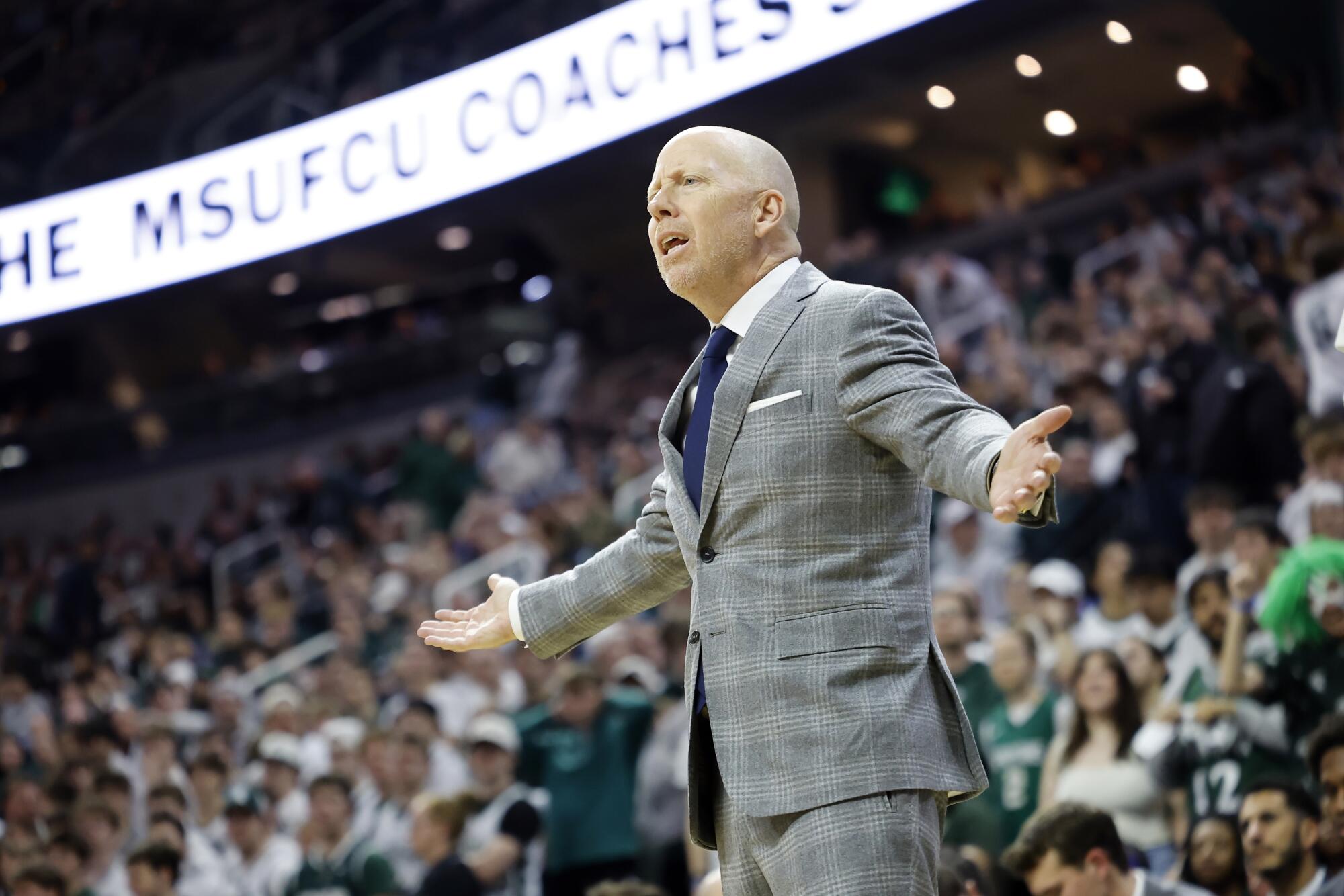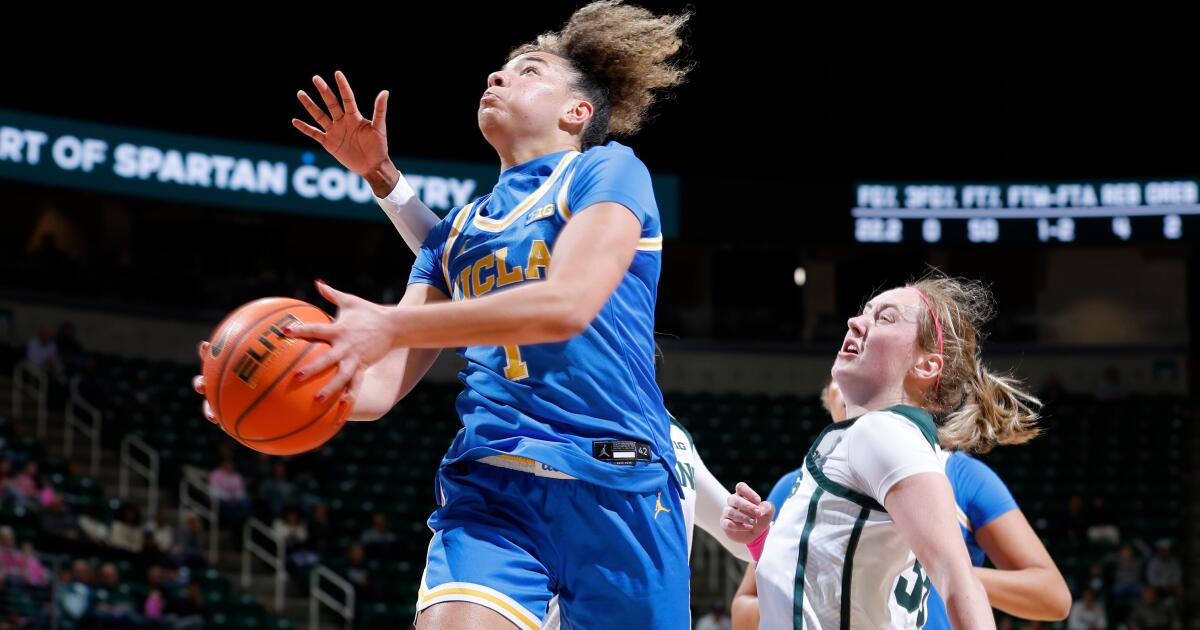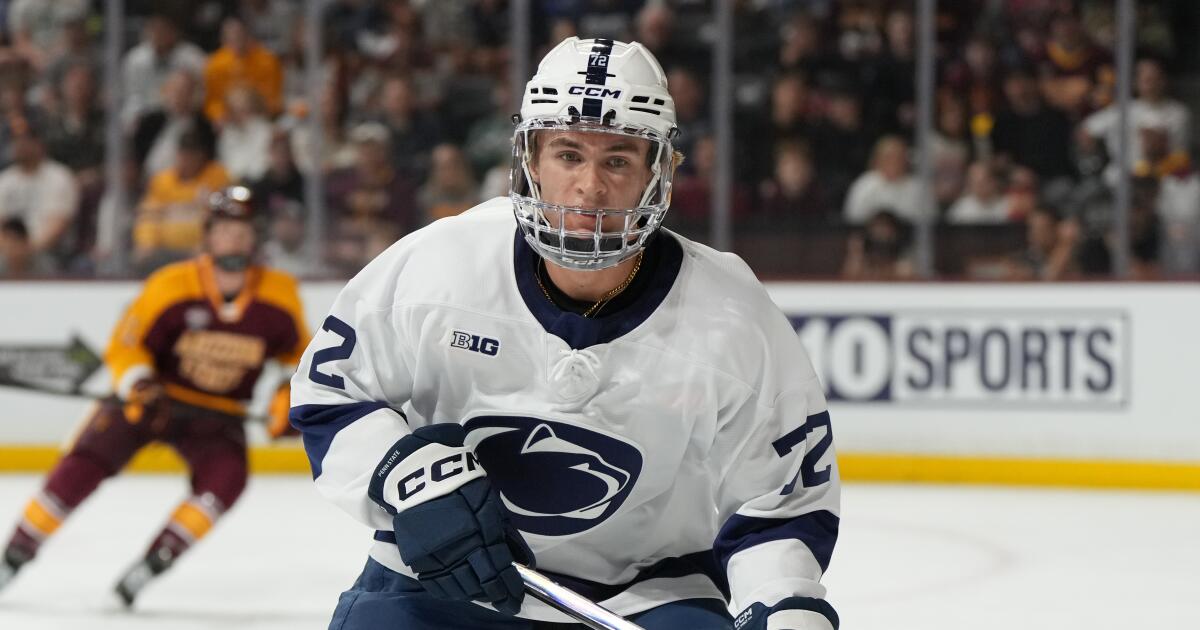UCLA must eject Mick Cronin if he can’t respect his players
It was the look on Steven Jamerson II’s face.
That was the toughest thing to watch. That was what seared into the mind. That’s what made you want to fire Mick Cronin on the spot.
It was a look of embarrassment. It was a look of confusion. It was the look of a young man who had just been cruelly pushed around by someone with more power.
Mick Cronin is a classic bully, and the fact that UCLA continues to empower him with new contracts and no questions is misguided malfeasance.
So, he wins games. He doesn’t win enough to compensate for incidents like Tuesday night in East Lansing, Mich., where Cronin became perhaps the first college coach in history to eject his own player from the game and order him to the locker room in the middle of the game.
Yes, Cronin holds players accountable. That’s fine, as long as he also holds himself accountable, but that didn’t happen when, after his team was beaten by 23 points by Michigan State in a second consecutive humiliating loss, he publicly criticized Jamerson for the hard foul that led to the ejection incident and then wrongly assailed a reporter for allegedly raising his voice during postgame questioning.
Cronin has become a walking viral video. He has become a nightly uncomfortable wince. He has become an embarrassment to a university athletic department that prides itself on winning with class.
John Wooden would be ashamed.
Mick Cronin is light years from the aura of Coach, and if UCLA cared a whit about the legacy of its legend, it would care that his flame has been completely snuffed by this unworthy keeper.
Wooden’s home is now decorated with a pyramid of poop, and one wonders how many humiliations will be required to convince administrators to clean things up.

UCLA coach Mick Cronin extends his arms and complains while watching the Bruins lose to Michigan State Tuesday in East Lansing, Mich.
(Rey Del Rio / Getty Images)
Cronin quietly signed a new five-year contract last summer that includes a $22,5 million buyout if he is fired this spring. That figure drops to $18 million, then $13.5 million, then $9 million, then $4.5 million in coming years. No wonder the Bruins didn’t publicize the deal at the time. It was another Martin Jarmond mistake, and now the entire university is going to pay the price.
It’s hard to see UCLA canning Cronin in the next couple of years because of those buyouts, which means this mess of a program is going to be increasingly hard to watch.
What happened Tuesday should scare away any of the remaining top prospects who would want to play for this berating blowhard. His usual postgame rants don’t compare to what happened on that Michigan State court, where he picked on the wrong kid in the worst possible fashion.
By all accounts, Jamerson is a dream player, one filled with resilience and gratitude. The former Crespi High star initially wanted to play for Michigan State, but he couldn’t make the team, even as a walk-on, so he tried to become a student manager, and failed at that, too. After spending a year there as a student, he transferred to University of San Diego, where he spent three seasons strengthening his game before eventually transferring to UCLA. This season he has spent most of his time on the bench, playing about 11 minutes per game for the Bruins while supplying rebounding and defense and energy.
It was this fire that led him to give chase to Michigan State’s Carson Cooper in the final five minutes of a game that UCLA currently trailed by 27. Cooper went up for a fast break dunk and Jamerson knocked him to the floor. It was ruled a Flagrant 1 excessive foul, but not a dangerous Flagrant 2 foul, so Jamerson was not ejected from the game.
At least, that’s what he thought.
Moments later Cronin was grabbing the kid’s shirt and leading him to the baseline, where he ordered an assistant coach to remove him from the court area and banish him to the locker room.
Jamerson’s dreams of a solid return to a school that snubbed him were shattered. His night ended amid a storm of laughing students and obscene gestures.

UCLA coach Mick Cronin shouts toward the bench while sending Steven Jamerson II to the locker room after the player was called for a foul Tuesday at Michigan State.
(Rey Del Rio / Getty Images)
It was just awful, and so avoidable. Why couldn’t Cronin have just sent Jamerson to the end of the bench? Considering it wasn’t a Flagrant 2, why did he even have to take him out of the game? Why did he have to make an example of a player who was understandably overeager on what could have been one of the triumphant nights of his life?
“Steve’s a good kid. He made a bad decision. But if you want to be a tough guy, you need to do it during the game, for a blockout, for a rebound,” said Cronin afterward.
“So, I was thoroughly disappointed; the guy was defenseless in the air. I know Steve was trying to block the shot, but the game’s a 25-point game. You don’t do that.”
That point could have been made without humiliation. But Cronin wasn’t done, later admonishing a reporter for what he considered a dumb question, then scolding the reporter for allegedly raising his voice at him.
The question was about the student section’s harassment of former Spartan Xavier Booker, which seemed like a legitimate query considering Booker had a terrible game. But what was really baffling was Cronin’s claim that the questioner was raising his voice.
Listen to the video. No voices were raised. It was just Cronin once again being a bully. You want a raised voice? Here, I’ll raise my voice in words that Cronin will hopefully understand.
CHILL OUT! SHOW RESPECT! HONOR WOODEN!
If the coach doesn’t grow up and the program doesn’t rapidly improve — for a third straight year they’re barely a tournament team — there needs to be another ejection.
It would be the most expensive firing in UCLA history. It would be worth every penny.


